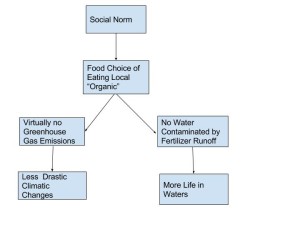- Recently we have been seeing the social norm or movement to eat local “Organic” food. I am not an expert on what makes something technically organic, but considering that I am an avid Outdoorsman and locavore, my definition of organic is only food collected from the wild or locally grass fed. I ran into this social norm at the supermarket, where the price of a steak with a “Local Organic” sticker was more expensive than one down the isle labeled not organic. I ended up choosing the organic steak because the social norm suggested that it was the healthier option due to the lack of use of Genetically Modified Organisms (GMOs) to feed the cattle resulting in a healthier animal and a healthier product. The animals were most likely free to roam grass fed animals. That treatment before slaughter is also more humane prior to processing.
2.My food choice of being a local organic consumer is not only for my health. The lack of buying locally organic food is beneficial to the reduction of two societal issues including water contamination as well as the increase in greenhouse gasses in the atmosphere. The use of fertilizers in order to promote plant growth has caused the water to retain these chemicals and caused the levels of algae to skyrocket and the oxygen in the water to plummet to lifeless spots. The lack of oxygen has caused the life in these bodies of water to have detrimental effects on the living organisms living in such bodies of water. The use of gas and other natural resources used as resources in order to transport food results in the release of green house gasses from emissions of these ways of transportation. This is virtually eliminated when we consume local organic food.


Hey Gavin,
My name is Jordan, you can check my blog post out here: http://sites.psu.edu/geog30/2016/03/04/social-norm-food-choice/
I think it is interesting how people approach buying food in the grocery store. It is a choice between spending more money for a richer product that is ethically and environmentally friendly, or the cheaper product and keeping more money in your pocket and possibly buying more food. I grew up in a farming community and I saw the negative effects you listed first hand. Water contamination of local streams and creeks were killing wildlife in the area. It is an important decision we make have we go to the grocery. I know I too eat organic and local, but it is more readily available in Southern California than it is in rural winter markets.
Thanks for sharing your post!
-Jordan
Hi Gavin, I’m Siying and here’s the link to my post: http://geog030.dutton.psu.edu/2016/03/04/social-norms-on-food-choice/
I agree on your point of the higher price of organic food in the market. But unlike the choice you made, I usually just pick the cheaper one. However, I think you make a good point about the lack of GMO and healthier animals, I think I would choose organic products next time when I shop! I also mention the transportation cost behind fast food in my post and I think people don’t usually think that when they purchase food, so it’s a good thing to consider.